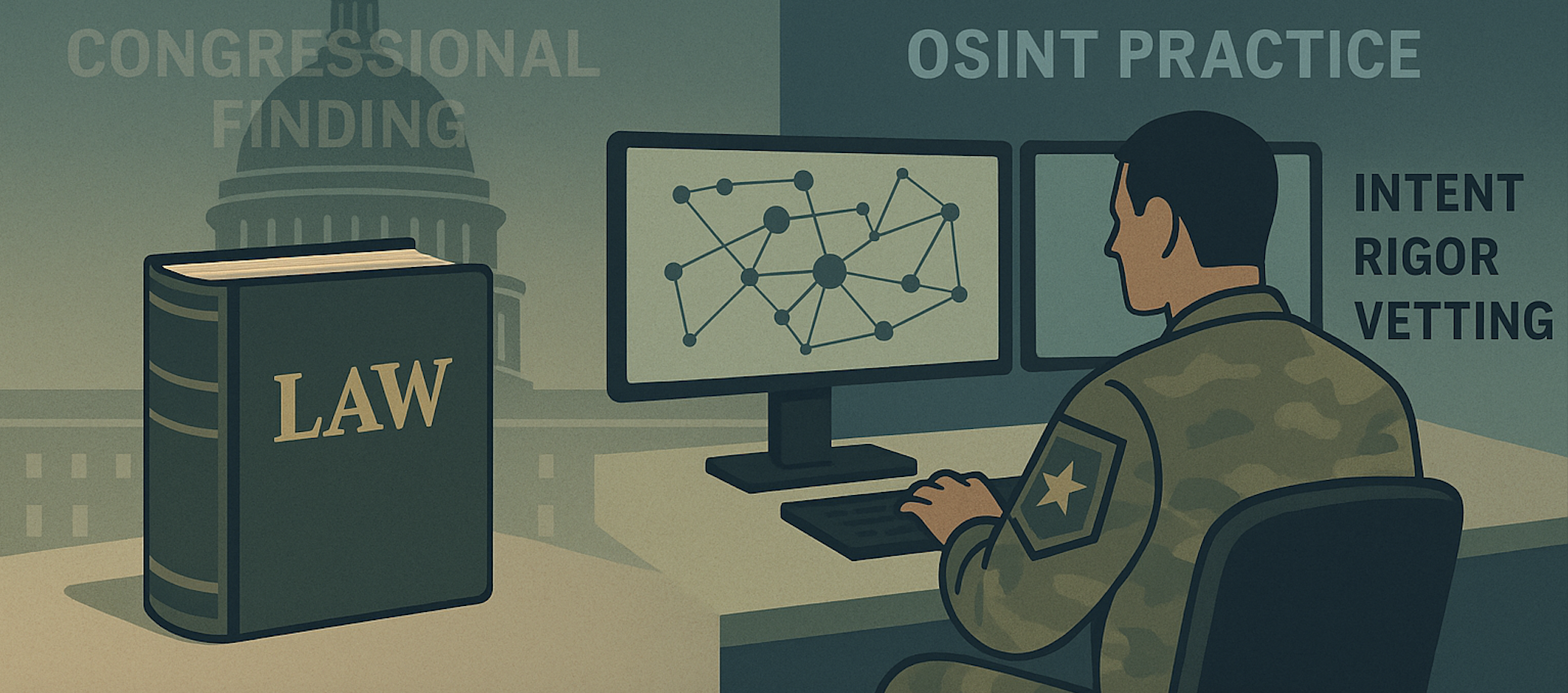
Regarding the Definition of OSINT in Public Law
By Jeffrey Mader
November 11, 2025
There is growing confusion surrounding the legal definition of Open Source Intelligence (OSINT) and its applicability to Army intelligence operations. The Army currently defines OSINT as:
Intelligence that is produced from publicly available information and is collected, exploited, and disseminated in a timely manner to an appropriate audience for the purpose of addressing a specific intelligence requirement. [i]
The crux of the issue is that this definition suggests that any soldier who generates intelligence from publicly available information (PAI) is conducting OSINT.
This definition first appeared in the 2006 National Defense Authorization Act[ii] and was later amended to Title 50 of the U.S. Code.[iii] Many interpret the definition’s presence in U.S. Code as a legally binding mandate. The intent of the public law, however, was to prompt the Secretary of Defense to develop a strategic framework for, “integrating OSINT into the Defense intelligence process.” [iv] Congressional findings are considered prefatory—they provide context but do not carry independent legal force. [v] The definition of OSINT appears in the law only as a “congressional finding” which provided context leading into the legally binding text. According to the Library of Congress:
Like other prefatory text, congressional findings generally do not have independent legal effect or ‘override the plain meaning of specific provisions—regardless of whether they are included in the bill itself or in the legislative record.’[vi]
And courts have consistently held that congressional findings cannot override statutory language or constrain agency discretion.[vii]
While the Department of Defense and the Army have adopted this definition by reference, it is not prescriptive. Services—and all department and agencies within the DoD—retain the authority to define OSINT to meet their own operational and policy needs.
The core challenge with relying solely on the public law definition is that it implies any individual generating intelligence from publicly available information (PAI) is conducting OSINT. This dilutes the professional and doctrinal standards we apply within Army Intelligence. True OSINT, as we practice it, is not just about access to PAI—it is about intent, rigor, vetting, and integration within a validated intelligence process.
We need to reconsider the definition of OSINT such that it maintains its analytical integrity and mission alignment within the Army context.
End Notes:
[i] Army Directive 2016-37 (Open Source Intelligence Activities)[ii] Pub. L. 109–163, div. A, title IX, §931, Jan. 6, 2006, 119 Stat. 3411[iii] 50 U.S.C. § 403-5[iv] Pub. L. 109–163, div. A, title IX, §931, Jan. 6, 2006, 119 Stat. 3411[v] see Reeves v. Astrue, 526 F.3d 732. “…(quoting Equal Access to Justice Act, Pub.L. No. 96-481, § 202, 94 Stat. 2325 (1980) (codified at 5 U.S.C. § 504 note, “Congressional Findings and Purpose”)) … Congress’s general statements of findings and purpose to override the plain meaning of specific provisions of the Act. See Samuels v. District of Columbia, 650 F.Supp. 482, 484 (D.D.C.1986).[vi] https://www.congress.gov/crs-product/R46484#:~:text=These%20introductory%20statements%20may%20take%20the%20form,ascertain%20Congress's%20purpose%20in%20enacting%20the%20law.[vii] See Morrison, 529 U.S. 598 “But the existence of congressional findings is not sufficient, by itself, to sustain the constitutionality of Commerce Clause legislation. As we stated in Lopez, ‘[S]imply because Congress may conclude that a particular activity substantially affects interstate commerce does not necessarily make it so.’” 514 U. S., at 557, n. 2 (quoting Hodel, 452 U. S., at 311) (REHNQUIST, J., concurring in judgment)). Rather, "'[whether particular operations affect interstate commerce sufficiently to come under the constitutional power of Congress to regulate them is ultimately a judicial rather than a legislative question, and can be settled finally only by this Court."' 514 U. S., at 557, n. 2 (quoting Heart of Atlanta Motel, 379 U. S., at 273 (Black, J., concurring)).” Morrison, 529 U.S. at 614; see also Charles Tiefer, After Morrison, Can Congress Preserve Environmental Laws from Commerce Clause Challenge? 30 Envtl. L. Rep. 10888, (2000) (positing that after the Morrison decision "congressional findings are no longer a magical panacea" for attenuated links to interstate commerce, but offering reasons why congressional findings can still play a role in justifying environmental regulations).